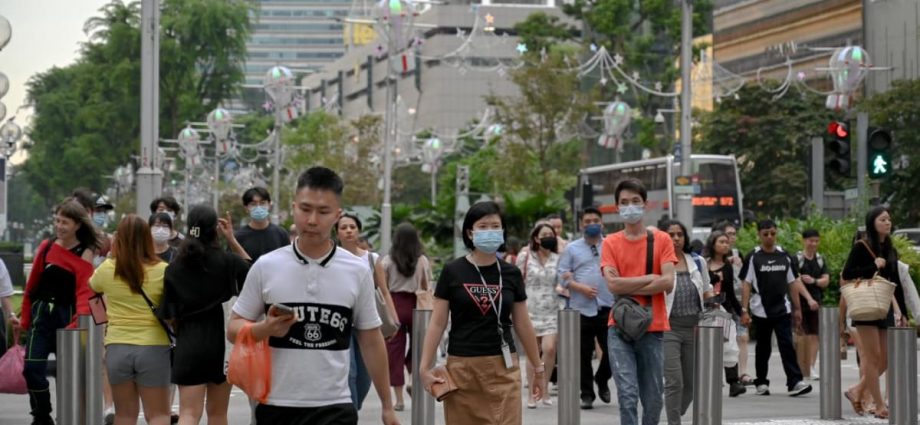
SINGAPORE: To reposition Singapore for a “new era” of global development, the Government will spend around S$104.2 billion to grow the economy, equip workers and build up the country’s collective resilience, while making immediate moves to help families and vulnerable Singaporeans cope with high inflation.
Delivering the Budget 2023 speech in Parliament on Tuesday (Feb 14), Deputy Prime Minister and Finance Minister Lawrence Wong said that the world’s economy is expected to enter a stage of greater contestation and fragmentation, with nations thinking less about mutual benefit and interdependence and more about national gain and security.
“An era of zero-sum thinking has begun,” he said, adding that such a world will be less hospitable to small economies such as Singapore.
“We therefore cannot assume that we can continue to be successful by doing the same things as we have in the past. We will need to adjust to this new era, reposition our economy and refresh our social compact for the future.”
In a wide-ranging speech lasting almost two hours, Mr Wong noted how China and the United States are jostling for leadership in key technologies, thereby setting off a trend of greater economic nationalism and protectionism around the world.
Governments are increasingly imposing sanctions, investment prohibitions and export controls, as well as implementing aggressive tax breaks and subsidies to anchor strategic industries within their countries, he said.
As a result, businesses are reorganising themselves to account for “once-unimaginable” risks, with more multinational enterprises seeking to relocate to places where they are less likely to get caught in “geostrategic crossfires”.
At the same time, the scope for tax competition is expected to get tougher due to the global Base Erosion and Profit Shifting initiative, which limits the level of tax incentives that Singapore can use to attract foreign investments.
Singapore will need to adapt quickly to these changes, Mr Wong stressed.
While countries such as the US are rolling out vast subsidies to build strategic industries, it is not possible for Singapore to outbid these countries to lure multinational firms here, Mr Wong added.
“Neither can we afford to be complacent and simply take our competitive position for granted. We will therefore have to work harder to enhance our overall productivity and workforce quality to stay competitive in this new environment.”
ATTRACTING INVESTMENTS
To this end, the Government will set aside S$4 billion for the National Productivity Fund, as well as expand the fund’s scope to cover investment promotion and use it as a way to anchor quality investments in Singapore.
A new Enterprise Innovation Scheme will allow businesses to qualify for greater tax deductions of up to 400 per cent for spending on activities related to innovation that include:
- Research and development
- Registration of intellectual property
- Acquiring and licensing intellectual property
- Innovation carried out with polytechnics and Institutes of Technical Education
- SkillsFuture-approved training courses that are aligned to the Skills Framework for education, career development and skills upgrading
For now, businesses have tax deductions of up to 250 per cent on some of these activities.
Under the new scheme, firms that have yet to turn profitable and so are not able to maximise the benefits of tax deductions may covert 20 per cent of their total qualifying expenditure into a cash payout of up to S$20,000
The Government will also add S$150 million to the SME Co-Investment Fund to invest in promising small- and medium-sized enterprises, and will enhance the Singapore Global Enterprises initiative by S$1 billion.
EQUIPPING WORKERS
Apart from attracting investments, Mr Wong said Singaporeans should ultimately benefit in the form of wage growth and job opportunities, which is why the Government has invested in SkillsFuture.
But more still needs to be done to “shift our efforts into higher gear” amid a volatile environment, besides having more skills training that can vary in quality, he added.
Hence, there is a need for jobs-skills integrators – intermediaries who work with industry, training and employment facilitation partners. Mr Wong said they will be piloted in the precision engineering, retail and wholesale trade sectors to ensure that training translates to better employment and earnings.
Other moves announced for Budget 2023 included:
- Extensions of the Senior Employment Credit and the Part-time Re-employment Grant until 2025
- A S$2.4 billion top-up to the Progressive Wage Credit Scheme
- The Enabling Employment Credit will be enhanced to encourage firms to hire persons with disabilities and a new Uplifting Employment Credit will be introduced for employers to do the same for ex-offenders
DEALING WITH HIGH INFLATION
To help Singaporeans cope with inflation and cushion the impact of the rising Goods and Services Tax (GST) rates, Budget 2023 will set aside an additional S$1.6 billion for the Assurance Package, on top of the S$1.4 billion top-up Mr Wong had announced in November 2022, bringing the total package to S$9.6 billion.
Among the measures is a one-off Cost-of-Living Special Payment expected to benefit around 2.5 million adult Singaporeans.
The Government will also extend the Enterprise Financing Scheme and the Energy Efficiency Grant for another year until March 2024 to support businesses facing tighter financial conditions and high energy prices.

